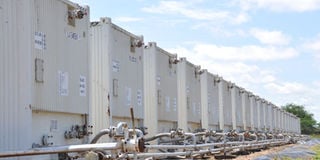Uganda toys with idea to increase recoverable oil by 102m barrels

Crude oil in containers in Hoima District. Government has decided to monetise the crude instead of burning it. PHOTO BY ERONIE KAMUKAMA
What you need to know:
To determine whether Uganda can boost its recoverable crude oil, PAU has embarked on pilot tests of polymer flooding, a mechanism that is expected to increase the country’s recoverable oil
It has always been debatable whether Uganda’s 1.4b recoverable barrels of crude oil can be increased, given the right company and technology.
According to Petroleum Authority of Uganda (PAU), many companies will claim to have the technology and ability to recover more than 1.4b but none of it is proven.
To determine whether Uganda can boost its recoverable crude oil, PAU has embarked on pilot tests of polymer flooding, a mechanism that is envisaged to increase the country’s recoverable oil.
“There are other tertiary methods such as polymer flooding that will help us produce even more than what we currently have as 1.4b barrels. We have done some laboratory tests based on that methodology,” Mr Bob Felix Ocitti, senior petroleum geoscientist at PAU, explained.
As the country approaches the development and production phase, the goal is to test the technology practically in the field.
“That is why we have planned as government together with the operators to do a pilot test of polymer flooding. Already we have done the laboratory tests, they look promising but for you to make a full field deployment, you must have attained a successful pilot project,” he said.
The pilot study will be conducted after the country starts production, expected in 2023, where the production method will be water flooding.
Water flooding
Water flooding is where water is injected into the oil field, usually to increase pressure and stimulate production. Once injected into the well, it sweeps or displaces oil from the reservoir and pushes it towards a well.
According to online sources, polymers are substances of high molecular mass which when applied decrease mobility of water and oil while the sweep efficiency factor increases.
Water flooding is cheaper than polymer flooding.
Polymer flooding based on laboratory tests could add 102m barrels to Uganda’s recoverable resources.
Uganda has a capacity of 6b barrels but only 1.4b of those are recoverable based on the available technology.
While polymer can increase the country’s recoverable resources, it is more costly than water flooding because of the cost at which it is disposed.
Due to its cost, government must determine the cost benefit analysis before it is deployed.
Crude oil set for sale
Government is set to sell off 45,000 barrels of crude oil that were recovered during the testing stages of oil production in the oil-rich Albertine region.
The crude oil is stored in specialised containers at four sites; Kasemene 1, Ngara-1, Ngiri-2 in Buliisa, and at Tangi Camp in Nwoya District.
According to Mr Ibrahim Kasita, the corporate affairs manager of the Uganda National Oil Company (UNOC), government decided to monetise the crude instead of burning it.
“We embarked on searching for a buyer. We advertised and got prospective buyers,” he said.
He, however, declined to reveal the buyers.
Mr Kasita also declined to announce the mode of transportation of the crude oil as well as its monetary value; saying the Minister of Energy and Mineral Development, Ms Irene Muloni, will reveal the details.
Price
The average price of a barrel of crude oil currently is $57.1 (Shs211,000) meaning Uganda’s crude oil would have a market value of around $2.5m (Shs9.2b).
The crude oil, UNOC says, can be transformed into heavy fuel oil that can be used in the production of thermal electricity.
Uganda which discovered oil more than 10 years ago, has not started commercial oil production.
There have been previous attempts since 2012, to dispose of the crude oil, although none was successful.
In 2018, the Auditor General faulted UNOC over its failure to dispose of the crude oil, which has been lying idle in storage tanks.
UNOC was established in 2015 as the company responsible for government’s commercial interest in all oil related activities, and is wholly owned by government through the ministries of energy and finance.




